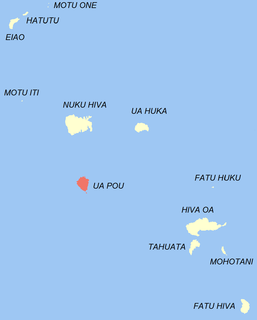 W
WBora Bora is a 30.55 km2 (12 sq mi) island group in the Leeward group in the western part of the Society Islands of French Polynesia, an overseas collectivity of the French Republic in the Pacific Ocean. The main island, located about 230 kilometres northwest of Papeete, is surrounded by a lagoon and a barrier reef. In the center of the island are the remnants of an extinct volcano rising to two peaks, Mount Pahia and Mount Otemanu, the highest point at 727 metres. It is part of the commune of Bora-Bora, which also includes the atoll of Tūpai.
 W
WBora Bora Island is a 19.91 km2 (8 sq mi) island in the Bora Bora Islands Group, within the Society Islands of French Polynesia. It is the main island of the commune by the same name.
 W
WMeheti'a or Me'eti'a is a volcanic island in the Windward Islands, in the east of the Society Islands in French Polynesia. This island is a very young active stratovolcano 110 kilometres (68 mi) east of the Taiarapu Peninsula of Tahiti. It belongs to the Teahiti'a-Mehetia hotspot.
 W
WMo'orea, also spelled Moorea, is a high island in French Polynesia, one of the Windward Islands, part of the Society Islands, 17 kilometres (11 mi) northwest of Tahiti. The name comes from the Tahitian Mo'ore'a, meaning "yellow lizard": Mo'o = lizard ; Re'a = yellow. An older name for the island is 'Aimeho, sometimes spelled 'Aimeo or 'Eimeo. Early Western colonists and voyagers also referred to Mo'orea as York Island.
 W
WNuku Hiva is the largest of the Marquesas Islands in French Polynesia, an overseas country of France in the Pacific Ocean. It was formerly also known as Île Marchand and Madison Island.
 W
WMount Ronui is a shield volcano of 1332m in Tahiti Iti, which is the south-eastern part of Tahiti in French Polynesia in the south Pacific. It is one of the principal peaks on the island and the highest in Tahiti Iti.
 W
WUa Pou is the third largest of the Marquesas Islands, in French Polynesia, an overseas territory of France in the Pacific Ocean. It is located about 50 km (30 mi.) south of Nuku Hiva, in the northern Marquesas. Until the beginning of the 1980s, it was the most populous of the Marquesas Islands, because when the other islands were being ravaged by diseases introduced by European explorers and traders, the Catholic priests on the island finally took to quarantining the remnant of the native population inside their churches whenever visiting ships approached the island, thereby reducing their exposure to external diseases.